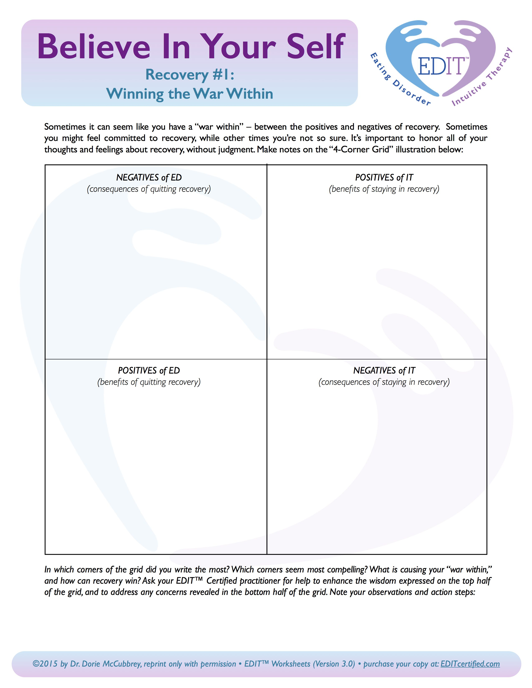
Believe In Your Self
EDIT™ Principle #5 – Believe In Your Self
The fiFTH EDIT™ Principle involves “complete recovery” and lasting freedom from eating disorder behaviors. However, before clients fully commit to their recovery, they are often filled with ambivalence. Sometimes, they want treatment. Other times, they cancel appointments and still find that their eating disorder “works.” If you witness your client in this ambivalence, here’s what you can do to help. The EDIT™ process involves having ED-IT dialogues with clients. Here’s what this might sound like:
ED (false self): I’ll always be eating disordered.
This belief reinforces ED as ones false self identity. It’s a self-fulfilling prophecy, ensuring the existence of ED indefinitely. However, the harmful effects of ED will eventually extinguish its own existence.
IT (True Self): I have a new life of freedom in recovery.
This belief affirms lasting recovery, with ones Intuitive Therapist (IT) guiding the way. There is a sense of ease, as the True Self embraces ITs new life.
Try this “taste” of EDIT™ – Winning the War Within
Sometimes the client is unsure which wolf they want to feed – false self or True Self, eating disorder or recovery. There can appear to be pros and cons to both. Click on the image below for a downloadable worksheet which you can use with your client, to shift their readiness for change.
Scroll below the image for guidelines about using the worksheet.
CLICK ON IMAGE TO DOWNLOAD AND PRINT
Eating disorder or eating disorder recovery? That is a decision that many clients make every day – and sometimes multiple times a day. It can often feel like a “war within” – as the client’s voice of the Eating Disorder (ED) seems to compete with the recovery wisdom voiced by the Intuitive Therapist (IT). Rather than dismissing ED’s arguments for “giving up on recovery” and “giving in to eating disorder behaviors,” it can be helpful to look more closely at exactly what ED is saying in the client’s mind. Similarly, it can be helpful to guide clients to examine their recovery wisdom in more detail, to notice the risks of their eating disorder behaviors and the benefits of recovery.
This worksheet walks clients through the various ED and IT messages, so they can clearly see the perspectives of both sides. Clients can “win the war within” as they honor ED and IT – and then make a decision where they choose to place their attention. If 51% of the client’s mind is focused on the benefits recovery, while 49% still considers the seeming advantages of their eating disorder – then recovery “wins.” The idea is to gradually guide clients to shift the percentage, so ultimately 100% of their attention is given to IT’s recovery wisdom.
This worksheet can be done in session, or assigned as homework. Suggest that the client start by completing the corner of the grid where their thoughts seem to be the strongest in that moment. For the purpose of illustration, let’s look at the top left corner first. Here, the client can list anything that they can think of that is a negative consequence of their eating disorder. The client can write a list, or just write words to full the box. For example, a bulimic client might write: life controlled by ED, burning my esophagus with stomach acid, rupturing my esophagus, sudden electrolyte imbalance, heart problems, accidental death.
The last statement in the above example might seem quite morbid – and yet that’s the reality of eating disorders. They can be deadly. When reviewing the grid with your client, be sure that they “get it” – any eating disorder behavior can cause accidental death. On the lighter side, now let’s look at the top right corner of the grid. Here, the client can list all of the positive outcomes they can imagine experiencing by staying in recovery. For example, that same bulimic client might write: I get my life back, totally at peace with food, learning to love my body, more friends, maybe marriage someday?
When reviewing this grid with your client, help them to realize that in “giving up ED” and staying in recovery, they open themselves to “a new best friend.” (Was ED really their friend anyways? Or more like an abusive lover?) ED behaviors usually happen in isolation, but recovery happens in connection with others. As clients expand this list of positive possibilities… sometimes fears arise. These are the perceived negatives of staying in recovery. For example: What if I don’t like the “new me”? What if I get really really fat? Will anyone ever truly love me? What if I end up alone?
This grid flows right into the final one – the benefits of quitting recovery, or, the perceived positives of ED. “Maybe ED isn’t so bad after all,” your client sometimes thinks. Here, that same bulimic client might write: ED is familiar, ED feels safe, purging helps me control my weight, I can avoid having to look at what scares me.
This process can reveal where your client is “stuck.” In this example, it’s fear – so you as the EDIT™ Certified practitioner might encourage your client to safely explore their fears with you. What if underneath what seems so safe and familiar (ED) lies their True Self (IT) – and it’s actually ED that’s afraid of IT, as if ED’s survival depends on keeping IT hidden! Guide the client to be curious… I wonder what your True Self is really like? What if your True Self holds the key to your happiness? Would you like my help to get to know the Truth of who you are?
©2018 by Dr. Dorie McCubbrey. Dr. Dorie is a Certified Eating Disorder Specialist and Licensed Addiction Counselor who is passionate about training professionals to effectively guide clients in recovery from eating disorders, through her Eating Disorder Intuitive Therapy (EDIT)™ Certified program. She also meets with clients at her treatment center, Positive Pathways PLLC, located in Evergreen Colorado. Learn more at: https://www.drdorie.com
Article may be reprinted with this author bio.
*****
Want more that this “taste” of EDIT™? Dr. Dorie is passionate about her method of Eating Disorder Intuitive Therapy (EDIT)™ to help people overcome eating disorders and addictions. She provides customized counseling for eating disorders and alcohol / drug addiction at her Positive Pathways treatment center in Evergreen, Colorado – and EDIT™ eating disorder training and certification for coaches and clinicians worldwide. CALL 303-494-1975 – EMAIL DR. DORIE – GET CERTIFIED




Hi, this is a comment.
To get started with moderating, editing, and deleting comments, please visit the Comments screen in the dashboard.
Commenter avatars come from Gravatar.